
For the descendents of Richard Dearie and his son John Russell
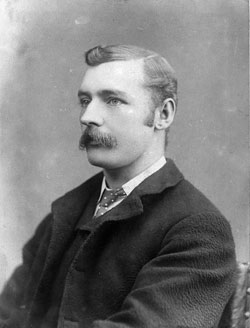
Henry Mossop
19 July 1860 - 31 December 1918
Solicitor
Compiled by Claire Grey
Henry Mossop was born on 19 July 1860 at The Butts, New Brentford, son of John Mossop, glass manufacturer and Elizabeth Cross. By the time of the 1871 census the family had moved to Bank Buildings, Bank, Wandsworth and his father had become a bank manager.
He was one of seven children, five of whom were boys. In 1881 he was an articled clerk to a solicitor, aged 20, and living at 7 Pembridge Villas, Wimbledon Park Road with his father John 50, his mother Elizabeth 47, his sister Mary 19, brother Charles 15, Walter 13, Lillie aged 10, and Samuel 7. By 1891 the family moved to Pevensey, Fountain Road, Enfield, but by this time Henry had married Madeleine Fox.
A letter exists from Henry to May written before they were married. He wrote from his work address, 1 Quality Court, Chancery Lane WC London August 1886.
“Dear Miss Fox, It is seldom that one’s duty in the discharge of an obligation is pleasurable, as mine is in this case. I hope I am right in thinking that a glance through this book will bring to your mind, such happy memories of pleasant times, as it would to mine. I have written to Mrs Fox thanking her for giving Frank and me the opportunity of spending such a glorious time as we did but to be quite honest I ought to thank you too. With kind regards to all, Believe me to be Yours sincerely Henry Mossop.”
He married Madeleine (May) Fox on the 26 April 1887 at the parish Church in Beckenham. At the time he was 26 years old and living in the parish of St Faith, Wandsworth. May is supposed to have married him out of pique, because an eligible and attractive man had been "playing with her affections". So to teach him a lesson she married Henry.
When they were married they lived in 1891 at 15, Earlsfield Road Wandsworth, with daughters Madeleine and Kathleen. By the 1901 census they lived at 12 Oakhill Road, Putney, In the family bible it gives the address as Caversham House, Oakhill Road, Putney. Their four daughters' birthdays are entered.
The marriage was said to be unhappy and Henry to be difficult. Neither of them got on well with the other, they were both very different characters. Henry had wanted sons and they had four daughters. He had little sense of humour. He was stickler for punctuality. Meals were at one o’clock. Henry would stand with his watch in his hand. If the bell didn't ring on time he swore at his wife for inefficiency. His youngest daughter Theo was afraid of him.
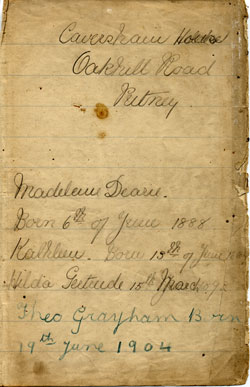
In December of 1916 he set off for a tour of the East, returning in June 1917. He talked about his illness in his letters home. He suffered from diabetes. The letters that he wrote to May from his cruise are affectionate, which the family found surprising.
Very little information about him has been recorded and few of his possessions were kept. He died on 31 December 1918 at the Grange, Ford Bridge Road, Ashford, Staines at the age of 58. His death certificate records that he had had heart disease for two years and died of heart failure and flu. His daughter Freda living at the same address was the informant and was present when he died. This makes him one of the few family members who died from the Spanish Flu pandemic after WW1.
Read Henry's letters from the East here.
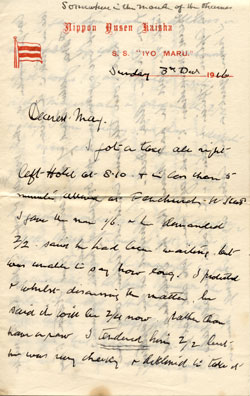
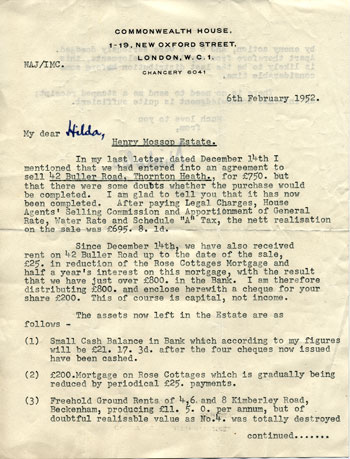
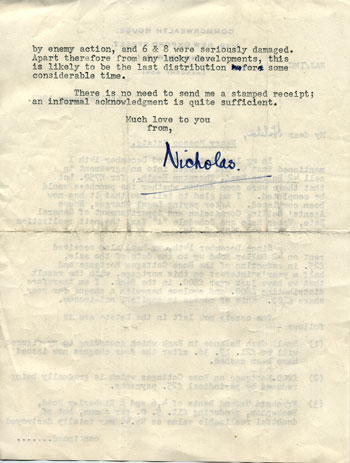
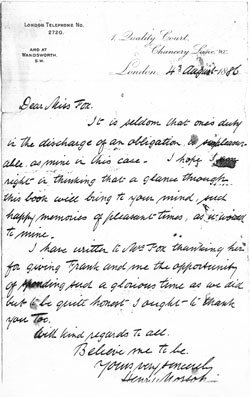
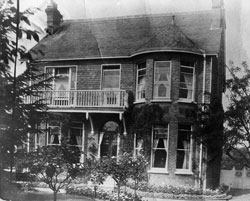
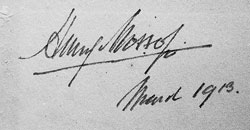
May was happy when they lived in Putney but Henry insisted on buying a bigger house with a billiard room. By 1911 they lived at The Grange, Ford Bridge Road, Ashford, Staines. Every Thursday afternoon Henry would have a billiard party. May had to prepare the food and his daughter Hilda would be roped in to hand round the sandwiches. Most evenings Henry spent with his friends drinking and smoking.
May's mother Annie and her sister Gertie tried to “tick Henry off” about his behaviour. The Grange backed onto a golf course and Henry was fond of golf. The only book with his signature in which was found at Dalvey Cottage was called “The Golf courses of the British Isles by Bernard Darwin”, published in 1910.
He had little time for his children but Hilda felt she had been the most loved. Her father liked her because she was good at golf, and picked to play for the ladies club team. He was a clever man and was supposed to be able to deal a pack of cards in his head and play them. It would be interesting to find out what his career in law was like.